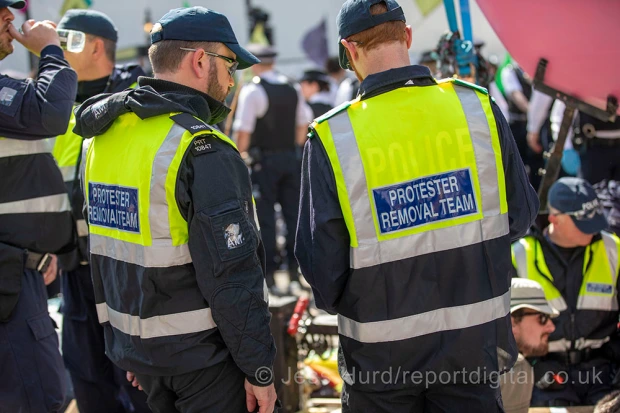Photographers rights campaign group I’m a Photographer Not a Terrorist (PHNAT) is shocked to learn the Metropolitan police were repeatedly caught attempting to use Section 14 (S14) of the Public Order Act to obstruct UKPCA press card carrying photographers and broadcast news cameras from covering arrests at the recent Extinction Rebellion protests in London.
The alarm was first raised by photographer Mark Kerrison, who was covering arrests at a peaceful lock-on protest in Oxford Circus on Saturday 20 April, in scenes not witnessed since the 2009 G20 London summit.
Kerrison said he was photographing arrests with two other photographers from the central reservation island on the south side of Oxford Circus at around 1.30pm when a senior officer ordered the police line to move everyone back or face arrest under S14. The senior officer was also heard replying to an officer, saying he did not care whether they press.
Kerrison said he and the other photographers were already quite a distance and being moved further back made documenting events “more challenging”. He added an officer on the cordon reiterated the arrest threat against one of the other two photographers, saying “you have been warned.”
In a second incident, a broadcast team from ITN faced similar threats on Friday 19 April as police moved into seize the pink boat being used as a blockade. Producer Jules Mattsson said he was told to move back or face arrest under S14. He challenged the law being used against the press, especially as he was returning to his camera crew who were still inside the outer cordon, as were many other accredited press.
In a tweet Mattsson said, “…but this is very dangerous. Police should not and must not be allowed to try and remove journalists from the area when they clear protestors.”
Was told this briefly in Oxford Circus when there for ITN, a robust response was given and we were left alone – but this is very dangerous. Police should not and must not be allowed to try and remove journalists from the area when they clear protesters @MetPoliceEvents @MetCC https://t.co/5dPtArwrhP
— Jules Mattsson (@julesmattsson) April 21, 2019
As arrests were being made on Waterloo Bridge late on Monday 15 April, one photographer working for a national news agency also told PHNAT that police officers informed him it did not matter if he had a press card, he was still liable to arrest.
Since the Extinction Rebellion protests began most press access has been very good, with officers respecting the UKPCA press card and allowing members of the press to work freely. Still these three serious incidents must be raised and challenged to avoid repetition.
On the second day of protests against the 2009 G20 London summit a vigil was held for Ian Tomlinson was held outside the Bank of England, the newspaper seller who died following contact with riot police during the protests the previous evening. That time a City of London police inspector was caught on camera telling a large group of members of the press that refusing his orders to leave the area would “spend the rest of the afternon in the cells”. He expressed his own personal contempt for the press by adding “the only thing I believe in the paper is the actual date”.
The Metropolitan police issued an apology six days later. A spokeswoman form the Met said: “Section 14 was applied outside the Bank of England to disperse protesters,” she said. “There may have been some photographers caught up in that. If so we apologise. We respect the right of photographers to cover current events.”
For years organisations representing press photographers and videographers such as the National Union of Journalists (NUJ) and the British Press Photographers Association (BPPA) have tried to work with the Metropolitan police force in order to educate officers during training in the role and the rights of the press during public order events, including a joint NUJ/Met training video released in 2016. Despite these efforts the last week of protest and civil disobedience by Extinction Rebellion has seen members of the press facing the same mistakes of a decade ago.
It is important to remember that every member of the public has the right to film anything in a public place. It is the role of the press to report on events and incidents, in order to keep the public fully informed. The Metropolitan police and other police forces are responsible for ensuring all officers are correctly trained to respect and uphold these rights.
